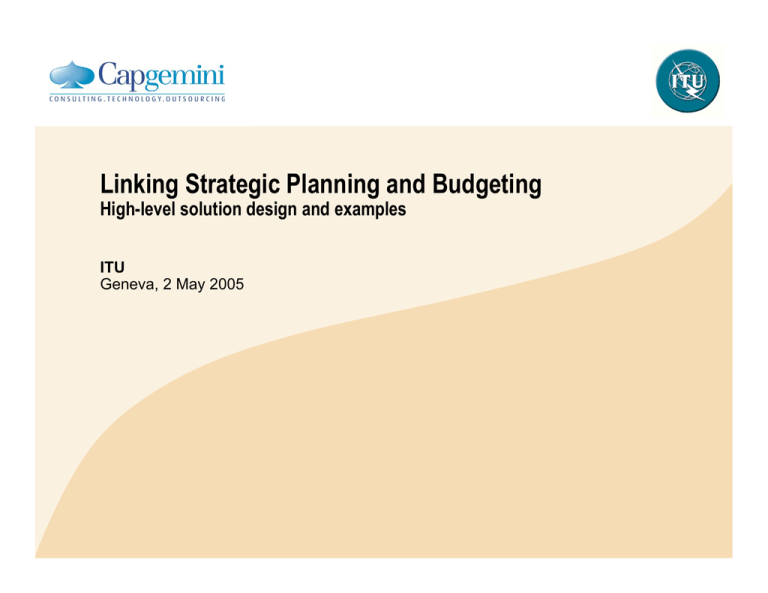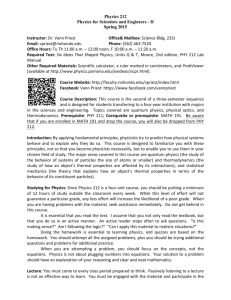
Linking Strategic Planning and Budgeting
High-level solution design and examples
ITU
Geneva, 2 May 2005
CE v5.5
Preliminary notes
• Capgemini has been asked to develop an approach to link Strategy and (Result-based)
Budgeting at ITU. This proposal must be considered as an input for a working meeting that will
be arranged in the current week (to be scheduled for the 15 February and organized by Mr.
Raymond Chalindar).
• This approach considers:
-
the output-related budget data and budget relations
-
the overall and sector-related objectives of the ITU.
This presentation give the main ideas about the idea and results of the approach as well as the
required prerequisites.
CE v5.5
© 2005 Capgemini - All rights reserved
ITU LINKING STRATEGIC PLANNING AND BUDGET.V.1.0.PPT
2
Linking Strategic Planning and Budgeting:
The overall perspective
CE v5.5
Overall Objectives
Objective-related
target budgeting
Objective-related
budget allocation
Strategic Planning
Sector Objectives
Operational
planning
Outputs
Result-based
budgeting
• Result-based budgeting provides
an effective solution for an
integrated bottom-up budgeting
integrating resources, activities
and outputs and covering also
flexible drill down capabilities.
Operational planning with a
stepwise transformation of sector
objectives on delivered outputs
and required resources is already
established at ITU, but needs
further harmonization and
alignment across the sectors*
• What's missing is a systematic
linkage between strategy
(objectives) and operations
(outputs to achieve the objectives)
in terms of budget respective
financial data. An approach which
we may refer to as ´strategic
budgeting´ is highlighted in this
presentation
Activities
Resources
Operational Planning
* See also the corresponding opportunity elaborated by
Workstream III and ranked as critical from ITU
© 2005 Capgemini - All rights reserved
ITU LINKING STRATEGIC PLANNING AND BUDGET.V.1.0.PPT
3
Objective-related budget allocation:
General approach
• In our approach aggregated outputs, sector and overall objectives
are logically interlinked to
understand if outputs are
contributing to the different
objectives of ITU.
• RBB will provide concrete bud-get
numbers per each output for
budget allocation
• The interlinkages will be
implemented by a percentagebased distribution of the output
budgets both on the level of
outputs and sector objectives. We
consider two options for budget
allocation:
- equally allocation by applying
mean values
- individual allocation by entering
percentage values per each
linkage node
CE v5.5
Budget per output
Budget per sector and overall objective
from
RBB
Aggregated
Outputs
Sector
Objectives
O1
SO1
...
...
Om
SOm
O1
SO1
...
...
Om
SOm
Overall
Objectives
OO1
ITU-R
OO2
ITU-D
OO3
O1
ITU-T
...
Om
Intersectoral
SO1
OO4
...
SOm
O1
SO1
...
...
Om
SOm
OO5
OO6
Sector objectives need
to be consolidated
© 2005 Capgemini - All rights reserved
ITU LINKING STRATEGIC PLANNING AND BUDGET.V.1.0.PPT
4
Objective-related budget allocation :
Example for an equally budget allocation
• The example illustrated on this slide shows the allocation of output budget data - derived from
RBB - to sector and overall objectives applying an equally percentage allocation which will be
set automatically by the application
• Please note that the original budget will be completely allocated both on the level of sector and
overall objectives. In this example aggregated output 1 (RBB budget: 5 Mill. CHF) will contribute to the achievement of overall objective 1 with an amount of 1,25 Mill. CHF
AO
AO1
AO2
AO Budget
5,00
10,00
15,00
CE v5.5
%
50%
SO
SO1
SO Budget
2,50
50%
SO2
2,50
50%
SO1
5,00
50%
SO3
5,00
15,00
%
50%
50%
50%
50%
50%
50%
100%
OO
OO1
OO3
OO1
OO4
OO1
OO3
OO5
OO Budget
1,25
1,25
1,25
1,25
2,50
2,50
5,00
15,00
OO
OO1
OO Budget
5,00
OO3
3,75
OO4
1,25
OO5
5,00
15,00
© 2005 Capgemini - All rights reserved
ITU LINKING STRATEGIC PLANNING AND BUDGET.V.1.0.PPT
5
Objective-related budget allocation :
Example for an individual budget allocation
• The example illustrated on this slide shows the allocation of output budget data - derived from
RBB - to sector and overall objectives applying an individual percentage allocation which has
to be entered by the user
• Please note that the original budget will be completely allocated both on the level of sector and
overall objectives. In this example aggregated output 1 (RBB budget: 5 Mill. CHF) will contribute to the achievement of overall objective 1 with an amount of 1,80 Mill. CHF
AO
AO1
AO2
AO Budget
5,00
10,00
15,00
CE v5.5
%
60%
SO
SO1
SO Budget
3,00
40%
SO2
2,00
30%
SO1
3,00
70%
SO3
7,00
15,00
%
60%
40%
50%
50%
30%
70%
100%
OO
OO1
OO3
OO1
OO4
OO1
OO3
OO5
OO Budget
1,80
1,20
1,00
1,00
0,90
2,10
7,00
15,00
OO
OO1
OO Budget
3,70
OO3
3,30
OO4
1,00
OO5
7,00
15,00
© 2005 Capgemini - All rights reserved
ITU LINKING STRATEGIC PLANNING AND BUDGET.V.1.0.PPT
6
Objective-related budget allocation:
Important prerequisites to be delivered by ITU
• Consolidation of currently defined sector objectives*
• Identification of logical links between (consolidated) sector objectives and overall objectives
of ITU
• Identification of logical links between aggregated outputs and (consolidated) sector
objectives
• Specification of distribution factors (percentage quotation) for each aggregated output and
each consolidated sector objective (individual distribution for budget allocation)
*
As documented in the ITU Strategic Plan and sector-related operational plans.
CE v5.5
© 2005 Capgemini - All rights reserved
ITU LINKING STRATEGIC PLANNING AND BUDGET.V.1.0.PPT
7
Objective-related Target Budgeting:
Simulating the effects of budget variations for overall objectives
• The approach described so far allows the
transformation of output-related budgets
into objective-related budgets. Given the
inherent hierarchy it corresponds with a
bottom up approach
• From a top down perspective a variation in
the budgets for overall objectives - the
strategic areas ITU wants to invest more or
less in the future - should be of major
interest for the budget addressees
• The general idea is to enter factors for
budget increase/decrease on the level of
overall objectives and to implement a
backward allocation on sector objectives
and aggregated outputs. A typical question
to be answered is: “What will be the effect
on the budget for a specific output if the
budget for a specific overall objective is rereduced by x %?“
CE v5.5
Budget per
overall objective
orig. budget
rev. Budget
OO1
63,80
-12,50%
55,83
OO2
45,75
3,50%
47,35
OO3
77,25
-8,25%
70,88
OO4
27,30
0,00%
27,30
OO5
40,95
5,50%
43,20
OO6
62,40
-9,75%
56,32
Total
317,45
300,87
Backward allocation
on sector objectives
and outputs
© 2005 Capgemini - All rights reserved
ITU LINKING STRATEGIC PLANNING AND BUDGET.V.1.0.PPT
8
Objective-related Target Budgeting:
Example based on the equally budget allocation
• The example illustrated on this slide shows the backward allocation of adjusted budget data for
overall objectives to the level of sector objectives and aggregated outputs. Distribution factors
are not required due to the pure aggregation of budget numbers
• Please note that the revised budget for overall objectives will be completely re-allocated both
on the level of sector objectives and outputs. In this example the budget for aggregated output
1 will be reduced from 5 Mill. CHF to 4,75 Mill. CHF
AO
AO1
AO2
AO Budget
5,00
10,00
%
50%
SO
SO1
SO Budget
2,50
50%
SO2
2,50
50%
SO1
5,00
50%
SO3
5,00
15,00
%
50%
SO
SO1
SO Budget
2,31
50%
SO2
2,44
50%
SO1
4,63
50%
SO3
3,75
13,13
15,00
AO
AO1
AO2
AO Budget
4,75
8,38
13,13
CE v5.5
%
50%
50%
50%
50%
50%
50%
100%
OO
OO1
OO3
OO1
OO4
OO1
OO3
OO5
OO Budget
1,25
1,25
1,25
1,25
2,50
2,50
5,00
15,00
OO
OO1
OO Budget
5,00
OO3
3,75
OO4
1,25
OO5
5,00
15,00
%
50%
50%
50%
50%
50%
50%
100%
OO
OO1
OO3
OO1
OO4
OO1
OO3
OO5
OO Budget
1,06
1,25
1,06
1,38
2,13
2,50
3,75
13,13
OO
OO1
OO Target
-15,00%
OO3
0,00%
OO4
10,00%
OO5
-25,00%
© 2005 Capgemini - All rights reserved
ITU LINKING STRATEGIC PLANNING AND BUDGET.V.1.0.PPT
9
Objective-related Target Budgeting:
Example based on the individual budget allocation
• The example illustrated on this slide shows the backward allocation of adjusted budget data for
overall objectives to the level of sector objectives and aggregated outputs. Distribution factors
are not required due to the pure aggregation of budget numbers
• Please note that the revised budget for overall objectives will be completely re-allocated both
on the level of sector objectives and outputs. In this example the budget for aggregated output
1 will be reduced from 5 Mill. CHF to 4,68 Mill. CHF
AO
AO1
AO2
AO Budget
5,00
10,00
%
60%
SO
SO1
SO Budget
3,00
40%
SO2
2,00
30%
SO1
3,00
70%
SO3
7,00
15,00
%
60%
SO
SO1
SO Budget
2,73
40%
SO2
1,95
30%
SO1
2,87
70%
SO3
5,25
12,80
15,00
AO
AO1
AO2
AO Budget
4,68
8,12
12,80
CE v5.5
%
60%
40%
50%
50%
30%
70%
100%
OO
OO1
OO3
OO1
OO4
OO1
OO3
OO5
OO Budget
1,80
1,20
1,00
1,00
0,90
2,10
7,00
15,00
OO
OO1
OO Budget
3,70
OO3
3,30
OO4
1,00
OO5
7,00
15,00
%
60%
40%
50%
50%
30%
70%
100%
OO
OO1
OO3
OO1
OO4
OO1
OO3
OO5
OO Budget
1,53
1,20
0,85
1,10
0,77
2,10
5,25
12,80
OO
OO1
OO Target
-15,00%
OO3
0,00%
OO4
10,00%
OO5
-25,00%
© 2005 Capgemini - All rights reserved
ITU LINKING STRATEGIC PLANNING AND BUDGET.V.1.0.PPT
10





